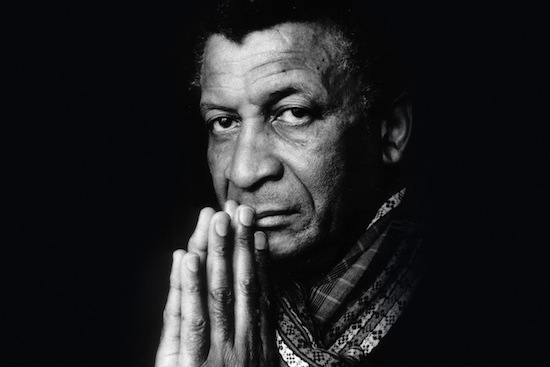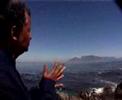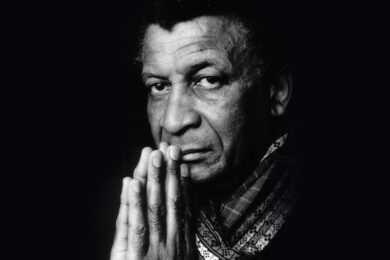Brace yourselves: this month’s Complete Communion is a monster, taking in a guide to the EFG London Jazz Festival, a preview of Glasgow’s GIOfest VII, and a swathe of album reviews that includes new sides from guitar virtuoso Mary Halvorson, heavy Dutch jazzers Dead Neandthertals with Colin Webster, and the mighty sax and drums duo of William Hooker and Liudas Mockunas. We also adjuciate a tussle between Borbetomagus’s Jim Sauter and Oneida’s Kid Millions and drift into the ether with Red Trio and Mattias Stahl. Our archival release of the month, meanwhile, is the stunning Ascent Of The Nether Creatures from a quartet led by undersung trumpeter Earl Cross. Dive on in!
EFG London Jazz Festival
The EFG London Jazz Festival, which runs from Friday 14 to Sunday 23 November, boasts one of its strongest lineups yet, featuring big names like Branford Marsalis, Bill Frisell and Jan Garbarek, and intriguing strands such as a Polish jazz showcase and a special residency celebrating British saxophonist John Surman’s 70th birthday. The admirably broad programme takes in mainstream and contemporary jazz, African and Indian music, blues and soul, and various strands of the avant-garde. Highlights include John Butcher and Mark Sanders’ reconstruction of Arabic 78 recordings, Tarab Cuts, and the unlikely reformation of Rock In Opposition stalwarts Henry Cow, who will be performing the music of their bassoonist Lindsay Cooper, who sadly passed away last year. Here at The Quietus, we’re particularly excited by the series of events marking the 20th anniversary of South Africa’s first full democratic election. In addition to contemporary piano star Bokani Dyer, the Festival features a panel discussion on South African jazz, and shows from the great Abdullah Ibrahim, aka Dollar Brand, and Louis Mohol0-Moholo’s Dedication Orchestra.
As a member of the Jazz Epistles alongside Kippie Moeketsi and Hugh Masekela, Abdullah Ibrahim recorded the first album by a black South African band. Moving to Europe in the early 60s, his Dollar Brand Trio combined township folk influences with Ellingtonia, hard bop and the avant-garde. Championed by Sir Duke himself, Ibrahim would go on to work with everyone from Max Roach and Don Cherry, to Archie Shepp and fellow South African Johnny Dyani (check out their amazing 1979 duo album African Echoes). Returning to South Africa in the 1970s, Ibrahim worked with a number of Cape Town musicians, developing the Cape jazz sound which yielded classics like ‘Mannenberg’, an unofficial national anthem during the apartheid era. In London he’ll be performing sets with his township jazz ensemble Ekaya and unveiling his new trio with reedsma Cleave Guyton and cellist Noah Jackson.
Drummer Louis Moholo-Moholo is the sole surviving member of The Blue Notes, the mixed-race South African group led by pianist Chris McGregor. Unable to continue playing in apartheid South Africa, the group relocated to London in 1965, where they later formed the nexus of the Brotherhood of Breath, a freewheeling big band whose blend of township jive, African folk, gospel, bop, Ellingtonia and free jazz is simply one of the most glorious sounds in the universe. To keep the music of his fallen brothers alive, Moholo-Moholo recruited many of the British players who passed through the Brotherhood ranks to the Dedication Orchestra, transcribing and re-arranging McGregor’s charts. For the EFG London Jazz Festival, an eye-popping line-up including Evan Parker, Annie Whitehead, Cleveland Watkiss, Keith Tippets, Maggie Nichols, Steve Beresford and many more will be performing the music of McGregor, Dudu Pukwana, Mongezi Feza and Johnny Dyani alongside a new commission.
Dalston’s avant-garde hub Cafe Oto contributes a number of exciting smaller shows, including a two-night residency from walrus-whiskered saxophone colossus Peter Brötzmann, who at 73 is making some of the most powerful music of his life. At Oto, he is joined by regular foils Jason Adasiewicz (vibraphone) and Steve Noble (drums). Their album, Mental Shake, recorded live at Oto, is one of 2014’s finest, with Adasiewicz opening up gorgeous purple-blue toneworlds under Brotzmann and Noble’s punky free improvisations. Who knows what to expect this time, but here’s hoping the Brötz brings his tarogato, a Hungarian pipe with a primordial tone.
Oto also boasts the latest episode of Orphy Robinson and Pat Thomas’s Afro-Futurist free improvisation project Black Top, whose #One album with saxophonist Steve Williamson is a highlight of 2014. Joining the London based piano, electronics and percussion duo across two nights are a number of special guests, including bassist Jamaaladeen Tacuma and drummer Tatsuhisa Yamamoto. Yamamoto also performs in a duo with the brilliant pianist Giovanni Di Domenico (check out his amazing 2014 album with maverick saxophonist Akira Sakata, Iruman) , alongside Xomaltesc Tbobhni, who are 2/3s of unpronouncable cyborg improv trio IIIn, as reviewed in October’s Complete Communion. Finally, let’s hear it for the fine UK double bill of saxophonist Paul Dunmall’s Deep Whole Trio and the sax and drums duo of Colin Webster and Mark Holub (Webster’s album with heavy Dutch jazzers Dead Neandthertals is reviewed below).
GIOfest VII
Up in the People’s Republic of Glasgow, the last weekend of November brings the seventh edition of GIOfest, Glasgow Improvisers Orchestra’s annual shindig at the CCA. A warm, friendly and often playful affair, GIOfest draws on the strength of Glasgow’s grassroots cultural scene, with local musicians and artists performing alongside international figures in large and small ensembles. This year’s theme is ‘Connected Elements’, with filmmakers Jo Ganter, Kate Cotter and Aileen Campbell presenting new work for the musicians to respond to. “The idea with Connected Elements is to look at new ways of collaborating and challenging the hegemony of the composer,” explains GIO leader Raymond MacDonald. Joining GIO are old friends percussionist and Tom Waits sideman Gino Robair, saxophonist John Butcher, improvising vocalist Maggie Nicholls, vibraphonist Corey Mwamba, French reedsman Michel Doneda and multi-instrumentalist and former Flying Lizard Steve Beresford, who will be leading a community workshop. New to the party are principle guest conductor of the BBC Scottish Symphony Orchestra and mastermind of the pioneering Tectonics festivals Ilan Volkov, and pianist and vocalist Maya Dunietz, who recently entranced Glasgow with her recital of the music of Ethiopian composer and nun Emahoy Tsuege-Maryam Guebrou. Norwegian free improv group Lemur, featuring the innovative french horn player Hild Sofie Tafjord, also perform.
On a related note, GIO’s Raymond MacDonald can be heard splashing around in a digital bubblebath with Australian musicians Alister Spence and Shoeb Ahmad on Isotropes, the debut album from their new trio Sensaround. Over Spence and Ahmad’s glistening maritime soundscapes, MacDonald’s soprano sax soars with beautiful siren calls and swooping seagull tones. Out now on Cube, it takes electro-acoustic improv into strange subaquatic realms.
William Hooker & Liudas Mockunas – Live At Vilnius Jazz Festival
Earl Cross, Muhammad Ali, Rashied Al Akbar & Idris Ackamoor – Ascent of the Nether Creatures
Red Trio & Mattias Stahl – North And The Red Stream
(No Business)
Lithuania’s Liudas Mockunas is steadily building a reputation as one of Europe’s finest young saxophonists, his gutsy tone and textural acuity gracing outstanding releases such as last year’s Lava with bass behemoth Barry Guy. Live At Vilnius Jazz Festival captures him in conference with US drummer William Hooker, working up a warm storm of gutsy yet lyrical free jazz in the vein of Rashied Ali and Frank Lowe’s all-time classic Duo Exchange. As with all No Business releases, it’s superbly recorded, with a warm and open sound that gives a palpable sense of the air molecules being dispersed around a large room. Hooker’s bass drum packs a satisfying wallop, as he maintains a free pulse beneath his scurrying snare and rolling tom patterns. Mockunas projects his hearty tenor proclamations and exploratory soprano flights over this high energy field, leaving the listener in no doubt that this is one of those live sets where something powerful and exciting is happening.
Other new releases from the peerless Lithuanian label include Red Trio’s hook up with vibraphonist Mattias Stahl, North And The Red Stream, and the magnificent Ascent Of The Nether Creatures, buried treasure from the Loft Era team of Earl Cross, Muhammad Ali, Rashied Al Akbar and Idris Ackamoor. The latter is a raw live-recording from 1981, capturing four under-documented players on fire. Best known for his contributions to Noah Howard’s free jazz classic Black Ark, Cross tilts his trumpet towards heaven, unspooling knotty bop themes and engaging in spiralling interplay with Ackamoor’s saxophone. One of the great free drummers, Ali is on explosive form throughout, maintaining a free pulse while unleashing rolling thunder around the toms. Encompassing classic fire music, free bop and abstract night-music, Ascent is one of the archival jazz releases of the year – one to add to your shopping list alongside John Coltranes’s incredible Offering: Live At Temple University.
Taped last year in Kaunas, North And The Red Stream is much less immediate, but its pointillist piano and vibraphone constructions reward careful listening. Stahl resists the vibraphone’s familiar cool shimmer for a collection of metallic staccato tones and percussive strikes. Rodrigo Pinheiro’s piano goes from fast, prickly clusters to passages of near silence, an approach reflected in Gabriel Ferrandini’s forensic drum deconstructions and Hernani Faustino’s slivers of bowed bass. The group’s democratic exchanges and heightened sense of dynamics and space make for a compelling set of abstract improvisation.
Dead Neandthertals & Colin Webster – Prime
(Gaffer Records)
Prime, from brutal Dutch duo Dead Neanderthals and British reed obliterator Colin Webster is a relentless onslaught of thunder and scorch that’ll either have you pinned to your seat in a state of sublime terror or leaping around the room with demented glee. Perhaps a bit of both. This is a supremely focussed performance, with an intensity and drive that reflects the Dutchmen’s love of grindcore and black metal. In contrast to the multi-directional flow of most free jazz drummers, Rene Aquarius hones in on his target and keeps surging forward, one snare volley after another. Webster (tenor) and Otto Kokke (baritone) ride the lightning, blasting out arcs of white hot bass tone while hunters sound their horns and shrieking Valkyries circle. Fusing the textural and tonal freedom of jazz and noise with the linear attack of metal, Prime is an absolute blast.
Kid Millions & Jim Sauter – Fountain
(Family Vineyard)
<iframe width="100%" height="166" scrolling="no" frameborder="no" src="https://w.soundcloud.com/player/?url=https%3A//api.soundcloud.com/tracks/170832208&color=ff5500&auto_play=false&hide_related=false&show_comments=true&show_user=true&show_reposts=false">
It’s always a joy to hear Jim Sauter’s saxophone outside the context of Borbetomagus’s raging inferno and this team up with Oneida sticksman Kid Millions does not disappoint. Placing a microphone in the bell of his horn and running it through a guitar amp, Sauter creates a distorted, metallic tone that recalls Jimi Hendrix or Keiji Haino as much as Albert Ayler or Arthur Doyle. On opening track ‘One For The Sun’, his horn roars into life like a waking dinosaur, raw tenor tones rising to primordial screams as he flees from Kid Millions’ relentless percussive pursuit. As exciting as it is to hear this duo at full-pelt, some of the most affecting moments are when they hold back to allow Sauter to explore his tenor’s whistling high-end or weld long arcs of feedback-damaged tone while Kid Millions adds timpani-like tom effects.
Mary Halvorson – Reverse Blue
(Relative Pitch)
For some, guitarist Mary Halvorson’s music might be a little too clever, and it’s true that she tends to keep her emotions in check. If you’re after the weep and scorch of a Sonny Sharrock or James Blood Ulmer you’ve come to the wrong place; taken on her own merits, however, Halvorson is a highly inventive composer and improviser, playful, yet fierce when she needs to be, with a knack for oblique melodies and rhythmic hooks which her crack New York quartet knock in and out of orbit. Reverse Blue‘s ten tracks feature some genuinely lovely tunes alongside some ingenious twists, with Halvorson wrapping her fingers around pretty Baroque figures, Moroccan modes, wiggy harmolodic runs and even the odd billowing power chord. Saxophonist Chris Speed is a graceful foil, while drummer Tomas Fujiwara continues to impress with his sensitivity, energy and invention.




